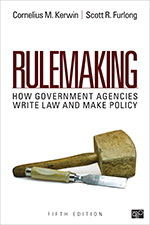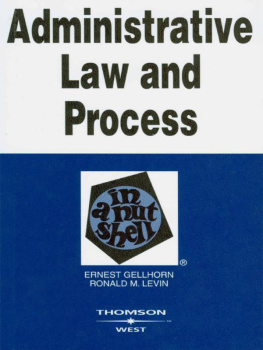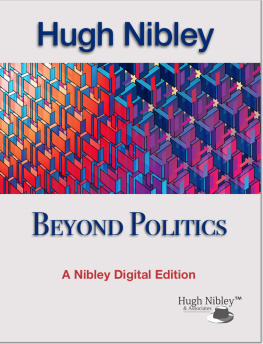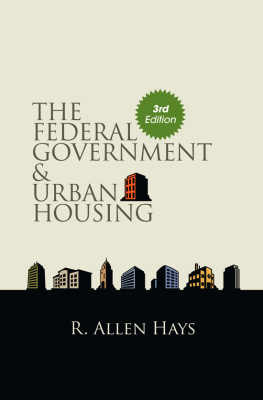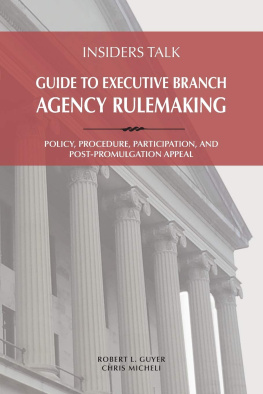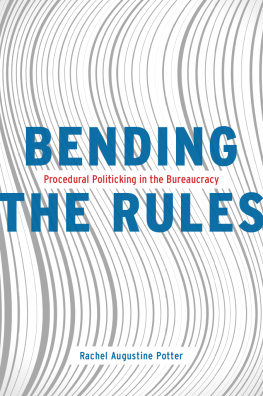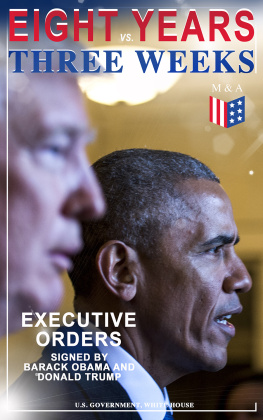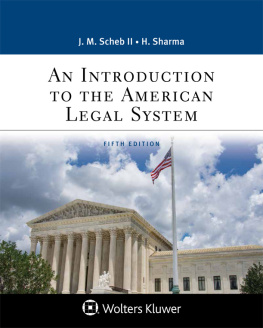Rulemaking
Fifth Edition
To Ann, Paul, Michael, Alex, Kara, Darcy, Violet, Jesse, and Sidney
Cornelius M. Kerwin
For Debbie, Kyle, and Darcy Furlong
and all they do to make my life complete
and
For Neil Kerwin, my colleague, mentor, and friend,
who spurred my interest in rulemaking
Scott R. Furlong
Sara Miller McCune founded SAGE Publishing in 1965 to support the dissemination of usable knowledge and educate a global community. SAGE publishes more than 1000 journals and over 800 new books each year, spanning a wide range of subject areas. Our growing selection of library products includes archives, data, case studies and video. SAGE remains majority owned by our founder and after her lifetime will become owned by a charitable trust that secures the companys continued independence.
Los Angeles | London | New Delhi | Singapore | Washington DC | Melbourne
Rulemaking
How Government Agencies Write Law and Make Policy
Fifth Edition
- Cornelius M. Kerwin
- American University
- Scott R. Furlong
- State University of New York at Oswego

- Los Angeles
- London
- New Delhi
- Singapore
- Washington DC
- Melbourne
Copyright 2019 by CQ Press, an imprint of SAGE. CQ Press is a registered trademark of Congressional Quarterly Inc.
All rights reserved. No part of this book may be reproduced or utilized in any form or by any means, electronic or mechanical, including photocopying, recording, or by any information storage and retrieval system, without permission in writing from the publisher.
FOR INFORMATION:
CQ Press
An Imprint of SAGE Publications, Inc.
2455 Teller Road
Thousand Oaks, California 91320
E-mail: order@sagepub.com
SAGE Publications Ltd.
1 Olivers Yard
55 City Road
London, EC1Y 1SP
United Kingdom
SAGE Publications India Pvt. Ltd.
B 1/I 1 Mohan Cooperative Industrial Area
Mathura Road, New Delhi 110 044
India
SAGE Publications Asia-Pacific Pte. Ltd.
3 Church Street
#10-04 Samsung Hub
Singapore 049483
Library of Congress Cataloging-in-Publication Data
Names: Kerwin, C. M. (Cornelius M.), author. | Furlong, Scott R., author.
Title: Rulemaking : how government agencies write law and make policy / Cornelius M. Kerwin, American University; Scott R. Furlong, State University of New York at Oswego.
Description: Fifth edition. | Thousand Oaks, California : CQ Press, [2018] | Includes bibliographical references and index.
Identifiers: LCCN 2018005802 | ISBN 9781483352817 (pbk. : alk. paper)
Subjects: LCSH: Administrative procedureUnited States. | Administrative regulation draftingUnited States.
Classification: LCC KF5411 .K47 2018 | DDC 342.73/066dc23 LC record available at https://lccn.loc.gov/2018005802
Printed in the United States of America
This book is printed on acid-free paper.
Acquisitions Editor: Monica Eckman
Editorial Assistant: Sam Rosenberg
Marketing Manager: Erica DeLuca
Production Editor: Veronica Stapleton Hooper
Copy Editor: Jim Kelly
Typesetter: Hurix Digital
Proofreader: Gretchen Treadwell
Indexer: Beth Nauman-Montana
Cover Designer: Glenn Vogel
List of Tables and Figures
Tables
- 16
- 16
- 17
- 18
- 20
- 20
- 21
- 23
- 88
- 130
- 192
- 218
- 221
- 228
- 231
Figures
- 41
- 70
- 83
- 84
- 85
- 102
- 103
- 138
- 181
- 182
- 191
Preface
In the preface to the first edition of this book, Kerwin explained the significance of rulemaking in the American system of government:
Rulemaking is the single most important function performed by agencies of government. Some readers may find this a surprising, if not outrageous, assertion. But consider the breadth and depth of influence that rulemaking has on our lives.
Rulemaking refines, and in some instances defines, the mission of every government agency. In so doing it provides direction and content for budgeting, program implementation, procurement, personnel management, dispute resolution, and other important government activities. Rules provide specific, authoritative statements of the obligations the government has assumed and the benefits it must provide. It is to rules, not to statutes or other containers of the law, that we turn most often for an understanding of what is expected of us and what we can expect from government. As a result, intense political activity surrounds the contemporary rulemaking process, and effective political action in America is no longer possible without serious attention to rulemaking.
The centrality of rulemaking in our public policy system has placed it under considerable stress. The demand for rules created by hundreds of new government programs and the intense scrutiny of the process by which they are developed give rise to persistent questions from the business and academic communities about the quantity of rules, their quality, and the time it takes to write them. Whether the problems the questions address are real or perceived, the questions themselves raise doubts in the publics mind about the ability of rulemaking to play its vital role. These doubtsand the failures they sometimes reflectoften reduce the effectiveness of public programs and reverberate throughout the political system.
Since the initial publication of this book twenty-four years ago, crisis and upheaval have been recurrent themes in the American experience. The third edition was completed shortly after the attacks of September 2001 forever shattered our illusions of physical invulnerability to external threats. The fourth edition appeared in the wake of the most dramatic economic downturn since the Great Depression, fueled by meltdowns in the housing market, exotic financial instruments often related to the mortgages that fueled the preceding boom. The response, known as Dodd-Frank, is a congressional statute justifiably described as the most significant program of financial regulation since the New Deal. Our country experienced more mundane but still disturbing threats to the safety of our food and water, physical environment, and workplaces. The integrity of governance of private and nonprofit institutions has been called into question. An effort to improve access to health care for those previously uninsured, known as Obamacare, was greeted with both praise and condemnation. Given the implementation issues of such significant laws such as Dodd-Frank and the Affordable Care Act, along with efforts by the Republican-controlled Congress to limit the Obama legislative agenda, it was not surprising to see former president Obama turn to executive actions such as rulemaking to accomplish legislative goals. Throughout it all, the one constant was the call for government action or intervention, and with that call the inevitable resort to rules developed in the complex and dynamic systems that are the topics of this book. The agenda of important issues changes constantly, and with it the cast of players in and out of government who determine the outcomes of rulemaking efforts. But rulemaking remains a constant.

